お問い合わせ先
Research Cooperation Division I,
International Program Department,
Japan Society for the Promotion of Science (JSPS)
5-3-1 Kojimachi, Chiyoda-ku, Tokyo 102-0083, JAPAN
TEL
+81-3-3263-1944
TEL
fos*jsps.go.jp
Note: Please replace*with @.

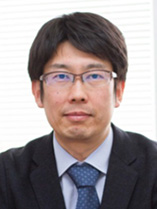 |
Takafumi Ueno Past Participations in FoS: |
|---|
I first participated in a JGFoS symposium in 2012, which was held in Potsdam, Germany. At that time, I was working at a research center in which the fusing of disciplines was actively pursued. Therefore, I was accustomed to listening with interest to presentations from various research fields, ranging from physics to informatics. So, when hearing presentations in fields of the social sciences, I felt much less out of place than I had anticipated.
In the symposium, an hour had been allocated for making presentations in each session, followed by an hour of Q&A. When a member of the audience asked a probing question, it would trigger a volley of more questions. The hour passed in what seemed like the brink of an eye. I found the interplay of conversation among the attending professionals to be very interesting.
I served as a Planning Group Member (PGM) for the succeeding JGFoS symposiums in 2013 and 2014. My most memorable, and I must say challenging, FoS experience happened in the planning group meeting for the 10th JGFoS symposium. I was responsible for the Chemistry/Material Science session together with my counterpart PGM on the German side. While her research was in a field closely associated with biophysics, mine was in biomaterial science and bioinorganic chemistry. Advised by our predecessors that the chosen theme must be “cutting-edge,” we tried desperately to find a topic in an area of chemistry where both Germany and Japan excel, but without success. So, we attended the planning group meeting in a state of crisis, not having come up with a comfortable proposal. Eventually, “imaging molecular motion” was chosen as the session topic by fellow PGMs. At this point, one of the JSPS FoS Advisory Board members commented that the technology for molecular observation developed in Japan is among the world’s most advanced. But, he asked that, besides demonstrating this technology, the session should use it to explore how issues on the frontier of science are tackled. Fortunately, the session was carried out successfully thanks to the valiant efforts made by the speakers, which gave me some sense of accomplishment. After that first session ended, however, I still hadn’t gotten over the feeling of having stumbled in carrying out my PGM role. But, at the get-together after the meeting, another member of the Advisory Board perceived my sense of dismay and told me that FoS sessions are not meant to entertain, but to be considered cutting edge by the PGMs. Greatly encouraged by this comment, I accepted a PGM assignment for the next JGFoS symposium.
I recently had an opportunity to get together with last year's JGFoS symposium members after the passing of some time. Again, the conversation bustled with talk about what’s cutting-edge, with everybody agreeing that you’d have to be a FoS symposium participant, especially a PGM or speaker, to know both the anguish and wonderment involved in choosing such topics. After all, the concept of cutting edge may differ between the organizers and attendants of a session, and the nuance of what’s cutting edge also differs from field to field. Moreover, the participants may not want to or be able to talk about what is genuinely cutting edge in their research.
As a scientist, I always think about what's original and cutting edge in my own research. However, by taking a step away from my research and engaging in discussions with scientists in other fields, I am made to perceive the narrowness of the world I live in and of my thinking. The research environment in Japan is thought to be stringent; nonetheless, opportunities for young researchers to start their own original research are many. In contrast, the same environment provides almost no chance for a mid-career researcher to “restart,”—change his ideas or fields so as to take on new research challenges. Looking back at the time I served as a PGM, I was able to conceptualize and advance my research while maintaining a close sense of affinity with the term “cutting edge,” even while being encumbered with various administrative tasks and duties. This was the greatest merit I received from participating in the FoS program and serving as a PGM.
In conclusion, I would like to extend my hearty appreciation to the JSPS FoS Advisory Board members and the JSPS staffs for the effort and support they give to operating and sustaining the FoS program.
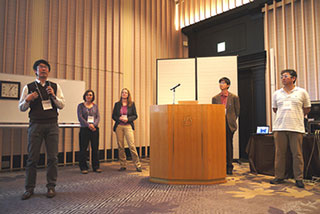 |
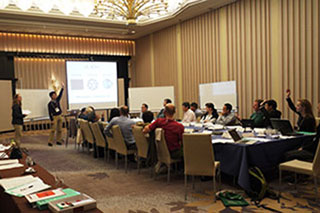 |
|
|
10th JGFoS Chemistry/Material Science Session |
10th JGFoS Planning group meeting |
|
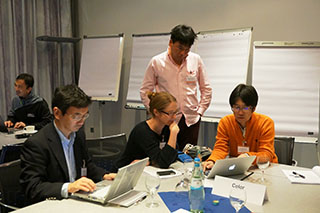 |
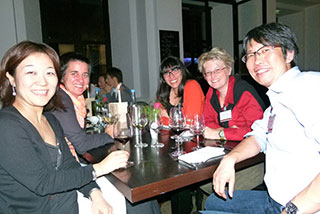 |
|
|
11th JGFoS Session coordination meeting |
11th JGFoS Cultural tour |